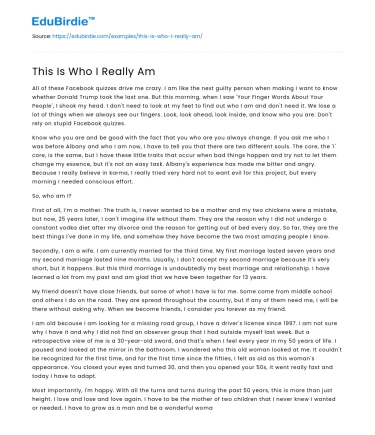Introduction
In the quest for self-discovery, the pursuit of understanding one's true identity remains a profound journey, often fraught with introspection and revelation. The statement "This is who I really am" encapsulates the culmination of self-awareness, where personal values, beliefs, and experiences converge to define an individual's essence. This essay explores the intricate process of unveiling one's authentic self, examining the interplay between societal influences and personal introspection. By delving into philosophical perspectives, psychological theories, and real-life exemplars, this discussion seeks to illuminate the complexities of self-identity. The exploration of selfhood is not merely an academic endeavor but a universal human experience, wherein individuals strive to reconcile external expectations with internal truths. Thus, the discourse on authenticity is not only timely but essential, as it prompts a deeper understanding of what it means to truly be oneself in an ever-evolving world.
The Philosophical Underpinnings of Authenticity
Philosophical discourse has long grappled with the concept of authenticity, with existentialist thinkers such as Jean-Paul Sartre and Martin Heidegger offering profound insights into the nature of selfhood. Sartre posited that individuals are condemned to be free, implying that the essence of self is not predetermined but constructed through choices and actions (Sartre, 1943). This existential freedom compels individuals to confront the inherent responsibility of defining their identity, free from societal impositions. Heidegger, on the other hand, introduced the notion of "being-toward-death," emphasizing the importance of living authentically by acknowledging the finite nature of existence (Heidegger, 1927). This existential urgency urges individuals to transcend superficial identities and embrace a more genuine self-awareness.
Save your time!
We can take care of your essay
- Proper editing and formatting
- Free revision, title page, and bibliography
- Flexible prices and money-back guarantee
In contemporary contexts, the philosophical inquiry into authenticity resonates with the growing emphasis on personal development and self-fulfillment. The rise of individualism, particularly in Western societies, underscores the importance of self-expression and autonomy in defining one's identity. However, this pursuit of authenticity is not without its challenges, as individuals often navigate the tension between self-assertion and social conformity. As philosopher Charles Taylor argues, the modern quest for authenticity involves a delicate balance between self-realization and communal belonging (Taylor, 1991). Thus, the philosophical exploration of authenticity serves as a critical framework for understanding the nuances of self-identity in the modern world.
Psychological Perspectives on Self-Identity
The psychological exploration of self-identity provides valuable insights into the cognitive and emotional processes that underpin the quest for authenticity. Erik Erikson's theory of psychosocial development, for instance, posits that individuals undergo a series of identity crises throughout their lifespan, each stage characterized by a conflict between personal desires and societal expectations (Erikson, 1950). These crises serve as pivotal moments of self-reflection, where individuals must reconcile competing influences to forge a coherent sense of self.
Moreover, Carl Rogers' humanistic approach emphasizes the importance of self-acceptance and unconditional positive regard in achieving authenticity (Rogers, 1961). According to Rogers, the alignment between one's self-concept and actual experiences is crucial for realizing one's true potential. This congruence fosters a sense of authenticity, enabling individuals to live in accordance with their values and aspirations. However, the pursuit of authenticity is often hindered by external pressures and internalized societal norms, which can lead to a fragmented self-concept. As psychologist Brené Brown notes, the fear of vulnerability and judgment often compels individuals to adopt inauthentic personas, masking their true selves in a bid for acceptance (Brown, 2012).
Thus, the psychological exploration of self-identity highlights the dynamic interplay between internal motivations and external influences in the pursuit of authenticity. By understanding these psychological processes, individuals can cultivate a more nuanced understanding of their identity, fostering greater self-awareness and personal growth.
Real-Life Exemplars of Authenticity
The journey toward authenticity is vividly illustrated through real-life exemplars who have navigated the complexities of self-identity. One notable example is Malala Yousafzai, whose unwavering commitment to education and women's rights exemplifies the courage to live authentically despite societal opposition. Malala's advocacy, rooted in her personal experiences and values, underscores the transformative power of authenticity in effecting social change. Her story demonstrates that authenticity is not merely an individual pursuit but a catalyst for collective empowerment and societal progress.
Similarly, the life of Steve Jobs serves as a testament to the role of authenticity in fostering innovation and creativity. Jobs' refusal to conform to industry norms and his relentless pursuit of excellence reflect a deep alignment between his personal vision and professional endeavors. His legacy illustrates that authenticity can drive not only personal fulfillment but also meaningful contributions to society.
These real-life exemplars underscore the profound impact of authenticity on individual lives and broader societal contexts. By embracing their true selves, these individuals have not only achieved personal success but also inspired others to pursue their authentic paths. Their stories highlight the resilience and determination required to live authentically in the face of adversity, offering valuable lessons for those embarking on their own journeys of self-discovery.
Conclusion
In conclusion, the exploration of authenticity is a multifaceted endeavor that encompasses philosophical, psychological, and real-life dimensions. The quest to declare "This is who I really am" involves a deep engagement with existential questions, introspective reflection, and the courage to defy societal expectations. While the pursuit of authenticity is fraught with challenges, it offers the promise of a more fulfilling and purpose-driven existence. By embracing their true selves, individuals can cultivate a deeper understanding of their identity, fostering personal growth and contributing to societal progress. As the discourse on authenticity continues to evolve, it remains an essential aspect of the human experience, urging individuals to navigate the complexities of selfhood with integrity and resilience. Ultimately, the journey toward authenticity is a lifelong endeavor, inviting individuals to continuously refine and redefine their understanding of who they truly are.






 Stuck on your essay?
Stuck on your essay?

